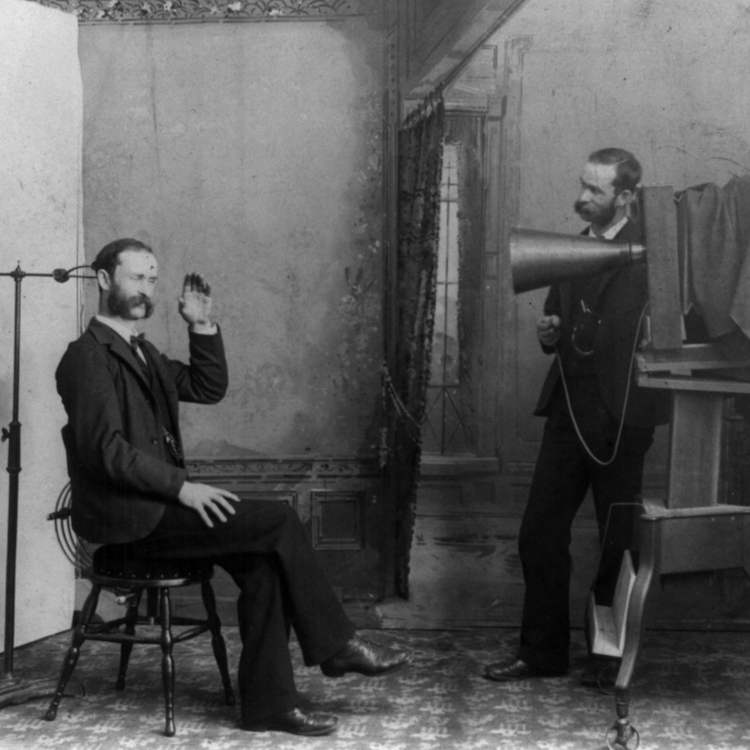In his reflections on The Life of Moses, St. Gregory of Nyssa places great importance upon one’s self-awareness regarding the spiritual journey, particularly that which is expected of a faithful servant of God. He describes knowledge of God as a “mountain that is steep and difficult to climb.” In recounting the darkness encountered by Moses, Gregory laments that while this darkness may appear contrary to religion, it actually provides the believer a pathway to greater insight.
“For leaving behind everything that is observed, not only what sense comprehends but also what the intelligence thinks it sees, it keeps on penetrating deeper until by the intelligence’s yearning for understanding it gains access to the invisible and incomprehensible, and there it sees God.” When Moses “approached the dark cloud where God was…he found himself initiated into the mysteries in the same inner sanctuary.”
St. Gregory contemplates why the “stream of faith received by some is fresh and clear, whereas for others the water becomes corrupted blood.” By doing so, he images man in two ways: either steeped in purity or wallowing like a frog. After death, the frog-like emotions (e.g., fleshy, sensual, licentious) will deliver unto such a man intense shame, which will disgust the soul. “It is as the Apostle says to those changed from evil to virtue: What did you get from this? Nothing but experiences that now make you blush.” For Gregory, “true being is true life.” In order to comprehend it, “…you must stand on the rock. This is the most marvelous thing of all: how the same thing is both a standing still and a moving. I mean by this that the firmer and more immovable one remains in the good, the more he progresses in the course of virtue.” Likewise, “the man who in his reasoning is uncertain, doubtful, and waivers in his opinions concerning reality will never attain to the height of virtue.”
Hence, Gregory calls us to build a life whose first prize is “being called a servant of God.” This prize, of course, will be awarded only after living a virtuous life. While recognizing that our present life is transient, this great saint recommends the wearing of shoes that will allow us to lead a life of self-control and austerity— ultimately protecting us from the thorns. His approach, therefore, challenges our spirituality by illuminating the chaff still present in our own lives.
“Let us observe that each man makes his own plagues when through his own free will he inclines toward these painful experiences. Recalling the Apostle: Your stubborn refusal to repent is only adding to the anger God will have toward you on that day of anger when his just judgments will be made known. He will repay each one as his works deserve.”
In providing this warning, we are challenged and admonished to wake up and be alert, for we know not when the master of the house will return. In this way, we will surely receive that “which comes down from above, which was not produced for us by any sowing in cultivated soil. Coming down from above, the bread is found upon the earth already prepared without the wheat’s having been sown or ripened. This bread, then, that does not come from the earth is the Word.”
In a world where many of us engage in “selfies” while remaining fearful of self-critique, let alone external criticism, this fourth century saint calls us to spiritual integrity and to pursue virtue within our lives so that we might “completely destroy the first beginnings of evil.” For our post-modern and post-Christian culture, St. Gregory of Nyssa offers a hopeful lens:
“It is clear to everyone that whatever belongs to material pleasure consists assuredly of earth or water, whether one is concerned with the pleasures of the stomach and the table or with the pleasures of wealth. The mixture of these elements becomes clay and is so called. Those who yearn after the pleasures of clay and keep on filling themselves with them never keep the space which receives them full; for although it is always being filled, it becomes empty again before the next pouring. In the same way the brick maker keeps on throwing yet more clay into the mould while it is constantly being emptied. I think that anyone can easily perceive the meaning of this figure by looking at the appetitive part of the soul.”
By painting a self portrait that looks solely to self, we will have surely placed ourselves on a path toward an unreflective life. And, given our human propensity to travel down such roads, St. Paul (Galatians 6:8) offers us a warning: “He who sows in the field of the spirit will get from it a harvest of eternal life, but he who sows in the field of self-indulgence will get a harvest of corruption out of it.”





